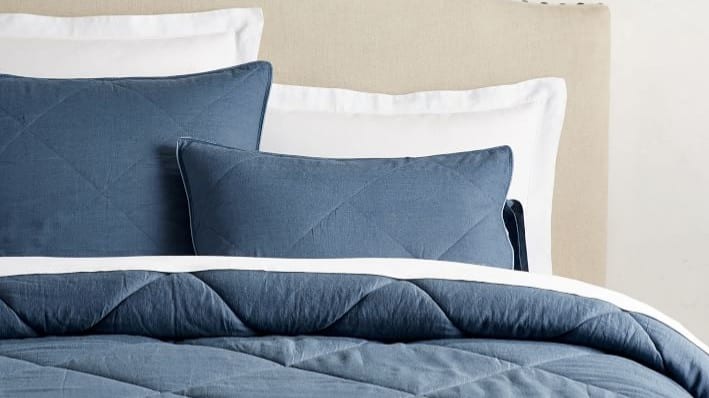This popular sleep gadget could be hurting your sleep—here's what to use instead
The more you know, the less you sleep
Products are chosen independently by our editors. Purchases made through our links may earn us a commission.
It's no secret that Americans aren't getting enough sleep each night. (As someone who wakes up perpetually feeling like I'm suffering from the worst case of jet lag, I can attest to this.) But besides the obvious culprits (looking at you Instagram and late-night TV), trying to figure out exactly why you're struggling to fall—or stay—asleep can be tricky.
Is it because you aren't getting enough REM sleep? Or because you have an undiagnosed case of sleep apnea? Or is it even simply because you sleep on the left side instead of the right? The endless possibilities alone could be what's keeping you up until 2 a.m.
That quest for the perfect night's sleep actually has a scientific name: orthosomnia. And according to a new study published in the Journal of Clinical Sleep Medicine, it could be causing you to get even less sleep (how ironic, right?). Researchers found that thanks to the rise in popularity of sleep trackers like FitBit and Apple Watch, "there are a growing number of patients who are seeking treatment for self-diagnosed sleep disturbances such as insufficient sleep duration and insomnia due to periods of light or restless sleep observed on their sleep tracker data."
How sleep trackers could be hurting your sleep
The study explains that people are becoming more and more preoccupied with improving or perfecting the numbers on their sleep trackers. So much so, in fact, that doctors are seeing more patients who have self-diagnosed themselves with sleep problems based solely on their tracker data.
That obsession with sleep tracker results could not only be causing more anxiety and stress for people (which in turn negatively affects sleep) but it could also be leading people astray and causing them to overthink their snoozing habits. "Most consumers are unaware that the claims of these devices often outweigh the science to support them as devices to measure and improve sleep," the study authors explain.
How to use sleep trackers the healthy way
To put it simply: stop obsessing. While sleep trackers can provide you with interesting insights into how you're sleeping, it's best to consider your results as part of a bigger picture. Because 1) sleep trackers aren't regulated so data can vary greatly based on which brand you're using and 2) there are tons of other facts that affect sleep that your tracker doesn't measure.
Researchers also advise people to always trust their bodies over the numbers on their sleep trackers. That means don't just stay in bed because your tracker says you should—and don't waste money on expensive (and unnecessary) treatments or equipment without consulting a doctor first. As Seema Khosla, MD, chairwoman of the American Academy of Sleep Medicine's technology committee, told The New York Times, "People will shell out 200 bucks for some sleep device, but we're not willing to just shut off our phones and go to bed."
The best gear to help you get better sleep ASAP

Get ready for your plushest bed yet.
1. The best pillow: Xtreme Comforts Shredded Memory Foam Pillow
Looks like a pillow, feels like a cloud. That's the best way to describe this memory foam pillow, which is the perfect balance of fluffy and firm. The foam molds to your head and neck as you sleep, providing support and comfort. Bonus: The cover is hypoallergenic and machine washable.
Get the Xtreme Comforts Shredded Memory Foam Pillow on Amazon for
2. The best comforter: Pottery Barn Linen Silk Comforter
Snuggle up with this plush comforter for a sounder snooze session. With its soft and smooth cotton-silk blend (which is made with sustainably-sourced materials!), our experts ranked it number one in terms of appearance, warmth, and upkeep. And even better, we found that stains come out very easily, so it's great for parents with kids or anyone who enjoys the occasional snack in bed.
Get the Pottery Barn Linen Silk Comforter from Pottery Barn for $59.50
3. The best bed sheets: Brooklinen Luxe Core Sheet Set
"I’m actually sad I have to take these off my bed." That's what one of our testers, Camryn Rabideau, who tried tons of sheets to find the perfect set, said about this pick from Brooklinen. Made from 100 percent cotton with a sateen weave, they're as cool and comfy as they are wrinkle-resistant and come in an array of colors and patterns.
Get the Brooklinen Luxe Core Sheet Set on Amazon for $149
4. The best weighted blanket: Gravity Blanket
Weighted blankets are having a moment—and for good reason. The Gravity Blanket, filled with glass beads, is said to reduce stress and anxiety and comes in three different weight options (15, 20, or 25 pounds). We tried the 15-pound model and found it was not too heavy, not too light, but just right.
Get the Gravity Blanket from Gravity for $249
5. The best mattress in a box: Nectar
A super comfy mattress that is delivered to your doorstep in one neat and tidy box? Sounds too good to be true but that's exactly what you'll get with Nectar. It even passed our wine glass test—when a full glass was set on one side of the mattress and someone was kicking around on the other side, the glass hardly wobbled.
6. The best earplugs for sleeping: Hearos Xtreme
If a snoring partner is keeping you awake, you may want to invest in our top-rated earplugs. The Hearos Xtreme are not only excellent at blocking out unwanted noise but they're also surprisingly comfortable to sleep in. Win-win.
